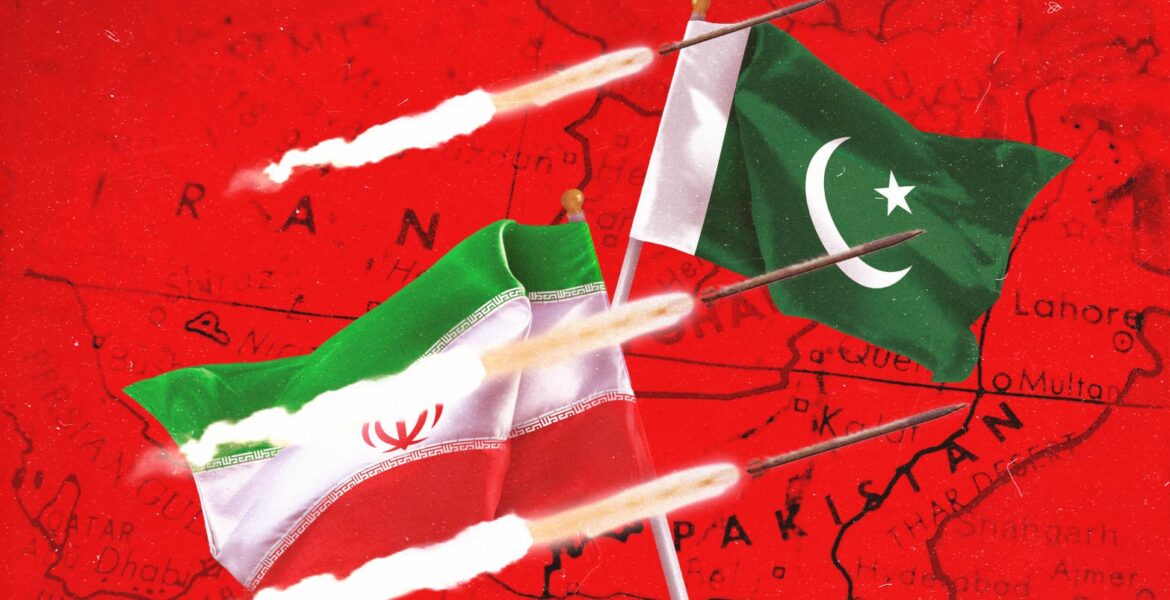The recent deadly attack by the militant group Jaish al-Adl that killed five Iranian police officers in the restive Sistan-Baluchistan province lays bare Pakistan’s stunning dereliction in confronting the terrorist forces operating from its soil. As Pakistan plunges deeper into political turmoil and economic despair, its feckless response emboldens extremists to wreak havoc in neighboring Iran. The timing of this latest atrocity could not be more reprehensible – it occurred in the final days of Ramadan, a period meant for piety and peace in the Islamic faith. But the Sunni extremists of Jaish al-Adl (whose name is the Orwellian misnomer “Army of Justice”) have repeatedly demonstrated their disregard for the most basic Muslim tenets through years of targeting Iranian civilians and security forces alike.
Behind the sanctimonious pretext of fighting for the rights of Iran’s Sunni Baluch minority lies the harsh reality – Jaish al-Adl is nothing more than a murderous band of takfiri terrorists who have strayed into violent apostasy. Even many Sunnis would be declared heretical infidels under their twisted, radical ideology. The unending instability and misrule plaguing Pakistan has been the root cause of such incidents. Under successive governments, both civilian and military-led, Islamabad has failed grotesquely to prioritize cracking down on violent extremist groups like Jaish al-Adl operating in its soil. Time and again, Pakistan’s counterterrorism efforts have amounted to little more than a cosmetic game of whack-a-mole. Highly publicized crackdowns on one militant outfit are invariably counterbalanced by the state’s willful blindness toward other equally pernicious terror groups – the ones still deemed valuable proxies for advancing Pakistan’s regional strategic interests.
This selective and opportunistic approach, putting realpolitik before ethical governance, has utterly hamstrung Islamabad’s ability to wage a truly comprehensive and consistent campaign against all terrorist forces operating from its turf. The lack of follow-through stems from the dizzying instability that has made even basic governance and law enforcement challenging in today’s Pakistan. The country continues to reel from escalating political unrest, protests, and vicious power struggles pitting the civilian leadership against the all-powerful military establishment.
This endless cycle of chaos and friction has stymied any coherent, sustained strategic direction and policy consistency from the highest echelons of authority in Islamabad and Rawalpindi. Counterterrorism strategies become just another casualty of Pakistan’s internecine feuding. The perfect illustration is the recent nadir in Pakistan’s relations with Iran. In January, tit-for-tat strikes by the two nations in their border regions, triggered by militant attacks, saw them sever diplomatic ties amid soaring tensions.
For all its rhetoric about combating terror, Islamabad has failed to dismantle the vast infrastructure of indoctrination, recruitment, financing and operational support networks stretching across Pakistan’s rugged frontier regions that allow groups like Jaish al-Adl to thrive. These areas, long marred by endemic poverty, lawlessness and underdevelopment, have become ideal breeding grounds that nourish anti-Shia sectarian hatred and a steady supply of disenfranchised young zealots. From Pakistan’s northwestern badlands to the Balochistan province bordering Iran, lightly-governed expanses offer abundant real estate for establishing safe havens to train, resupply and export terrorist footsoldiers. Pakistan’s pleas of seeking to root out all terrorist elements from its soil would perhaps be more credible if its security establishment did not blatantly turn a blind eye to Jaish al-Adl’s activities, recruits and sources of funding across these very sanctuaries.
But the sad reality is the country has become hopelessly mired in its self-inflicted cycle of embracing and discarding militant proxies depending on their perceived utility – counterproductive short-term thinking that only guarantees perpetual long-term instability. There appears little prospect for change when even the issue of terrorism has been reduced to a bargaining chip in Pakistan’s endless partisan power games. Under this circus of unraveling governance, terror outfits like Jaish al-Adl will inevitably keep finding ample running room to spread their poison into neighboring Iran. No amount of diplomatic pressure from Tehran can mask the fact that, until Pakistan charts a path out of its present-day morass through a credible democratic transition and civil-military rapprochement, its territory will remain a hospitable staging ground for cross-border militancy.
Compounding Pakistan’s motivation to finally get serious about combating all terrorist forces should be the concerns of its closest ally, China. As the flagship investor in the China-Pakistan Economic Corridor (CPEC), a key node of Beijing’s Belt and Road Initiative, China has a profound interest in regional stability. The prospect of militant groups disrupting CPEC’s development and safety of Chinese nationals and investments is an intolerable risk. Expect Beijing to sharply intensify pressure on Islamabad to secure the corridors crisscrossing Pakistan’s ungoverned spaces where terror groups currently thrive. The mounting death toll of Iranian police and soldiers in Sistan-Baluchistan attests to the heavy price paid when a state fails in its most solemn duty – establishing a genuine writ of law and order across the sovereign land under its control.
Until Pakistan can muster that once again, its descent into chaos will keep nurturing poisonous ideologies and inflicting deadly violence across the region and its borders. The blood of innocents, be they Iranian or Pakistani, will tragically keep spilling into the vacuum of authority created by the Pakistani state’s dereliction and self-destructive indiscipline.


